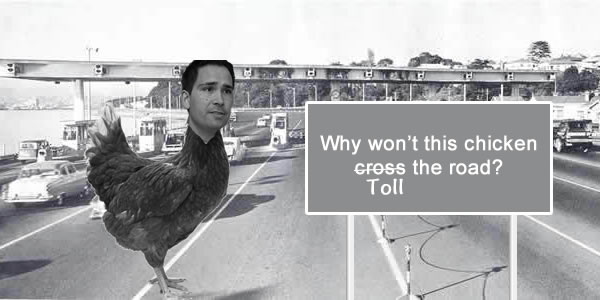Yesterday both the National Government and Green Party opposed the suggestion to place a toll on Auckland’s roads, but for completely different reasons. The Government opposes it because they see it as a new tax. The Greens because they would rather see the Government’s existing investment in roads moved to buses and trains.
The international evidence is clear: tolls and other congestion charges work – they raise revenue for investment and reduce the pressure on the roads at the same time. The Independent Advisory Board are right to raise it as an option for managing Auckland’s transport network. So why are politicians seemingly united against them?
Auckland’s transport conundrum
Auckland is rapidly headed toward a population of 2 million people by 2035. The Independent Advisory Board set up by the Council argues that population growth will cripple the current infrastructure, even with the existing Government spend of around $1b each year. They are arguing that another $300m is needed each year to make up the shortfall
Auckland is our country’s only world class city, capable of competing with the pull of Sydney or Melbourne, so it is important to get this stuff right. The city certainly needs to prepare if an extra 600,000 people will arrive in the next 20 years. The trouble is that the infrastructure for those extra people needs to be built now, but they aren’t around to help pay for it.
The Council’s Independent Advisory Board (IAB) suggested three options to pick up the shortfall:
- Rates increases of about $350 per property;
- Increased fuel excise; or
- Road tolls on motorways of about $2 per trip.
They argued that the fuel tax and rates increases would be relatively unfair – the extra cost would hit the poor and those that don’t use the roads as much as others. Despite the added costs of setting up a toll system, the IAB sees it as the best option going forward because tolls would simultaneously reduce congestion and raise revenue from the people that still use roads.
What are the objections to a toll?
The Transport Minister Simon Bridges responded that he was ‘very sceptical’ about all of the options. He sees the $1b spent on Auckland transport at the moment as sufficient. He opposed tolls in particular, arguing that if there were a toll placed on Auckland’s roads, the money should be going to central government. After all, they built the roads.
The Green Party on the other hand are arguing that tolls aren’t needed, at least not for a long time if – and here is the catch – if the existing road budget is switched to funding public transport. Unfortunately this is not an option for the Council, that decision lies in the hands of the Government, and given the recent election result it is unlikely they will change their mind. It is also difficult to know if the Green’s investment in public transport would be enough to convince Aucklanders to turn their backs on their cars and switch to public transport.
We’re not going to debate the relative merits of National’s plan for more roads nor the Greens’ proposals here. As we have talked about previously the government should make the information on transport choices more transparent for the public to make an informed choice.
What does the evidence say?
Economists would expect motorway tolls (like any price) to reduce the number of car trips taken. This encourages people to use alternatives such as carpooling, public transport, active transport or simply driving on other roads. Tolls would raise money from the people who continue to use the motorways and in return they would share the roads with fewer cars, getting a quicker trip. It sounds like a win/ win, but does it work out that way in reality?
The international experience says yes. London has had a congestion charge on car travel in the centre of the city for over a decade now. On the whole this has been very successful – raising revenue for the city to invest, reducing car trips and encouraging people to carpool, use public transport, cycle and walk. It is hard to fathom why the Green Party oppose tolls as they encourage the very things they get off on – use of public and active transport. It seems that ‘encouraging’ is not enough, they would rather dictate commuters use the modes the Green Party prefers. Likewise National should love the idea of road users paying for the congestion that they cause – good user pays principles, and the norm around the world.
Critics of the London scheme like to point out that car travel time is now the same as it was when the congestion charge was introduced, but this overlooks the huge shift that has happened in trips. London’s population has grown, and the extra demand for walking and cycling has meant some of the roads have been turned over to other uses. Without the congestion there would have been an extra 2 million car trips every day in the capital – in other words the city would be in gridlock.
But I have no option!
Unlike London, Auckland does not (yet) have the alternative of an excellent public transport for all of its citizens. This seems to be the main public opposition to tolls – that it would be unfair unless there is a viable alternative.
There is no perfect solution – not until Auckland has built the transport network it needs. Rates increases would hit all citizens, especially the poor those who don’t use motorways, much the same goes for the elderly. A petrol tax would be similarly poorly targeted. Tolls are the fairest way of raising this money – they encourage people to change their behavior and sting those that are not willing to do so.
[polldaddy poll=8410860]

